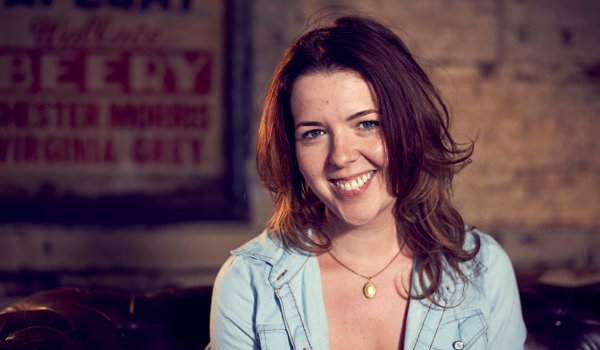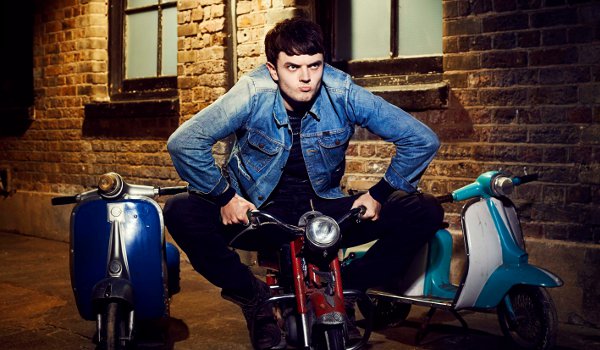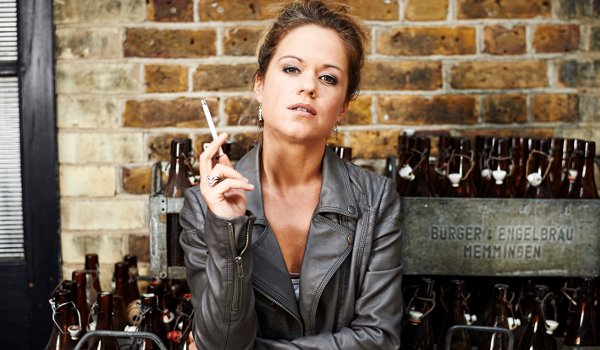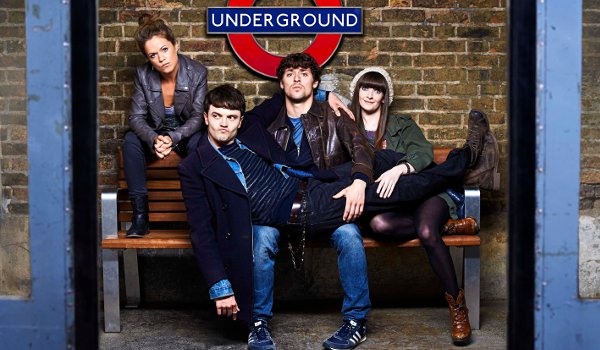AMID accusations of reinforcing stereotypes and casual racism, Channel 4’s series about four Northern Irish twenty-somethings hit TV screens last month.
Terrorism, paedophilia, necrophilia, drunken homosexual encounters and jokes concerning rape, Anne Frank and the Irish Famine feature in this new six-part comedy series. If you tuned in to the first three episodes and were easily offended, you may want to watch the remaining three episodes with caution.
Telling the story of four “hard-drinking, hard-living” Northern Irish twenty-somethings, the show is set to reignite debate about the portrayal of the Irish in Britain with its un-PC humour, incessant swearing, liberal use of ‘the C-bomb’ and booze-fuelled antics.
When Channel 4 announced last March that they were planning to make the show, there were accusations of reinforcing stereotypes and cries of casual racism.
All were based on a synopsis depiction that read: “For these four friends it’s not easy navigating their way through London life, particularly when they’re too drunk to know where they’re going, or remember where they’ve been.”
Channel 4 have since softened their sell of the show, removing most references to alcohol. “For these four friends,” their revised synopsis reads, “it’s not easy navigating their way through London life especially when they’re playing by rules only they get which leads to a whole load of wrongdoings.”
This heightened sense of wariness among the show’s press team is evident ahead of our meeting with London Irish creator Lisa McGee and two of the show’s stars, Sinéad Keenan (Being Human) and Kerr Logan (Game of Thrones).
 London Irish creator Lisa McGee
London Irish creator Lisa McGeePrior to our interview we are asked to outline the ‘angle’ our interview will take and, when we meet in the corner of central London Irish pub, Waxy’s Little Sister, Channel 4’s group publicity manager sits in on our conversation.
Throughout our 30-minute chat Keenan and McGee, in particular, are, if not guarded, then a little nervous. When the conversation turns as to how they expect the show to be received, Keenan greets the question with a nervous, cheeky smile.
“Are you still planning on going away,” she jokes to McGee, who is sat beside her. “Running away to avoid the whole thing!”
“I think I might,” comes the quick response from the Derry playwright and TV writer whose credits include RTÉ’s Raw and the BBC’s Being Human. “I haven’t thought too much about it, to be honest,” she adds. “I just hope that people find it funny. Or that some people find it funny. Then we’ll be alright.
"We had a good time making it,” she smiles, “so, there’s always that!”
Warm in conversation, McGee, whose writing background is in drama, loosely based the show on her own experiences of being London Irish during her twenties.
Her London Irish creations are, she says, something akin to the “dysfunctional family” of Northern Irish friends she built up in the absence of having any family in the capital.
There’s the feisty and aggressive Bronagh (played by Keenan), her weird and other-worldly brother Conor (Kerr Logan), the joyfully naïve and wilfully unaware Niamh (Kat Reagan) and the lad’s lad Packy (played by Love/Hate’s Peter Campion).
Situations they find themselves in over the first two episodes include relationships with violent offenders, necrophilia, encounters with one-armed friends and mentally disturbed lovers.
“With some of the situations [in the show] it’s obvious that it’s very loose and very exaggerated,” McGee says. “Often the situations are more like something that would have come out of a conversation with my friends rather than something that I’ve necessarily done.
"Then I’d just push that situation a bit further when I was writing it. Certainly the characters are all based on combinations of people I know, and some of the situations that we got ourselves into in London are in there.
"So it’s influenced by my own experience, but I’ve obviously just taken those ideas and ran with it and thrown everything at it.”
 Connor (Kerr Logan)
Connor (Kerr Logan)McGee decided to write the show after Channel 4 producer Liz Lewin (Beaver Falls, Teachers) joined her on a night out. The pair had been searching for an idea to collaborate on when Lewin met McGee’s Northern Irish friends and was taken aback as she listened to them “shouting at each other and drinking and having the craic”.
“She just said, ‘this is your show’,” McGee recalls. “This is what you should write about’. I didn’t think that it was a show because it was my life and it wasn’t interesting to me.
"So it was really Liz who said that there was an idea in this. She’s English so I think that her outside eye really helped because it’s not special when it’s just your life.”
A pilot was penned and Keenan, Campion, Logan and Reagan came aboard. Keenan had rarely laughed as much while reading a script.
“I was sitting on my own in my flat in East Dulwich and I turned the page over to the first reference to ‘c**t’... and I was gone. Just laughing so hard,” she says. “When all the scripts kept coming in, I was just wowed one after the other.”
Logan’s experience was the same. “It was genuinely the first comedy script I’d read that made me laugh out loud, not by what an actor was doing but by the dialogue.
"I actually was offered two theatre jobs and I had to decide which one to take or audition for this show. I turned both theatre jobs down. I was just like ‘even if I don’t get this job, it’s worth the risk of auditioning because it’s just brilliant”.
The first taster of the show released to the public was a short clip featuring Keenan’s character asking “we didn’t, did we?” when she wakes up hungover in bed with a small child.
Inevitably, more criticism of the show followed.
“It shocked me that people said it was shocking,” McGee said. “There is something particular about the Northern Irish sense of humour and our tone, and the way in which we address each other, which is maybe shocking just because people haven’t encountered it before.
"I genuinely thought I would never write something unless it made me laugh. Whether other people will find that funny or not, I don’t know.”
 Bronagh (Sinead Keenan)
Bronagh (Sinead Keenan)Logan agrees. During filming the cast and crew never set out to shock, he says.
“It never felt outlandish or difficult. I never thought ‘oh this is going to get such a reaction’ because it’s all very much character driven. It all feels very real, especially in the dynamic that Lisa sets up between the four characters.”
The accusations of reinforcing stereotypes and stoking racism against her own also surprised McGee. “It took me by surprise because that isn’t true,” she says.
“It’s not what the show is about so it’s not something that I worry too much about because I think that the minute that people see it in context, it will all become clear that it’s just four eejits in London having a good time.”
“The whole racism accusation that was thrown at it,” Keenan adds, “is... I mean it’s written by an Irish woman who has lived in London! So that in itself completely debunks that [accusation]. It’s not like an outsider going ‘this is what I think Irish people are like’.
As Lisa was saying, once you see that episode in context, with me and the kid, that paedophilia thing is a non-starter. It’s so clearly a joke.”
The characters themselves might also shock viewers in how feckless, unaware and selfish they come across in the opening episodes.
“The first episode of anything is about setting a tone and hitting something really hard,” McGee explains. “What I was trying to do with episode one of this is go ‘well, this is the world’ and these are the characters.”
Certainly as the series develops you see a very different side to Bronagh, and Packy’s kind of the moral heart of the group. He becomes more like a father figure albeit a really shit and crappy father figure. He’s the one who says ‘look lads, this might be wrong’.
“As well you’re saying that each of the characters are out for themselves,” Keenan interjects, “but with each episode, without giving away storylines, you see that there is a heart there in each of them. You might have to dig deep - very deep in some of them - but it’s kind of just like being in your twenties.
"You don’t really have to look after anyone else but yourself and that’s just the joy of youth. I think 20-year-olds tend to be a little selfish because they don’t have to be anything else. They are their own island in a way.”

If some of the reaction to the show might be attributed to the English media not getting this Northern Irish style of humour, are the trio concerned the viewing public will similarly be flummoxed?
“I think the Irish and Great British public are a bit cleverer than that,” Keenan says. “I would have a lot of faith in them. It’s a comedy. It could be four Americans living in Canada. It’s more a thing that you do in your twenties I think.
"I mean certainly that was definitely my experience when I moved over here. I didn’t get up to half of the shit that they get up to, but your friends become your pseudo family; you kind of cling on to them, particularly when you initially move to London.
"Certainly any meetings or gatherings that we had were in the pub, for hours, sitting over however much you could afford to drink as you put the world to right and taking the piss out of each other. That was it.”
“I think it’s a pretty universal experience for the Irish over here,” McGee adds. “But if a British audience got Father Ted then maybe there’s some hope that they might get this.”
“I showed the pilot to my brother, who is just at Uni, and a load of his mates,” Logan chips in, “and they were absolutely roaring with laughter, which was just great, especially from that age group. Their reaction was just sort of everything that I thought it would have been.”
“Look,” Keenan says as our conversation draws to an end, “some people will find it funny, some people won’t. Some people will like it; some people will find it offensive. We’ll just see what happens.”
London Irish continues for the next three weeks on Channel 4 on Tuesdays at 10pm.

